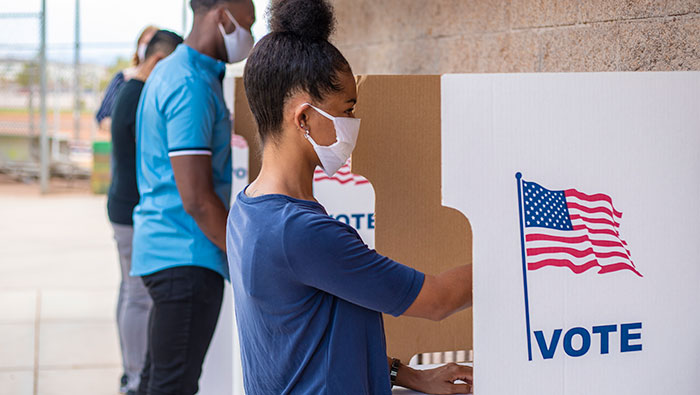
Race and racial attitudes have been at the forefront of this presidential election, but how much do they affect vote choice?
UC Davis political science alumni Isaac Hale, Ph.D. ’20 and Carlos Algara, Ph.D. ’19 investigated the subject and found the correlation is significant. The researchers say that while partisanship and ideology are still paramount when it comes to vote choice, the effect of racial attitudes cannot be overlooked. In fact, conservative racial attitudes can lead white Democrats to vote Republican. Their research is published in the December issue of Electoral Studies.
“We find that even today when Democrats are voting for Democrats at rates of 90 percent or higher that more conservative racial attitudes correlate with greater support for Republicans amongst liberals and amongst Democrats,” said Algara, who is an assistant professor at the University of Texas at El Paso. “I was expecting to find this only works amongst Republicans. But working with Democrats and liberals was pretty wild.”
Racial attitudes are measured by a series of questions that accesses emotional reactions to race and racism as well as people’s understanding of how race and race relations function in the United States. This is gauged by asking such questions as “do you agree that whites have societal privileges in America?” and “does racism make you angry?”
“Even though a majority of people in the United States no longer view themselves as having old-fashioned racist beliefs, we still see that there is a wide spectrum of racial attitudes, including among white voters,” said Hale, a lecturer at UC Davis. “And these differences really do matter.”
Importantly, Algara and Hale note that the effect is consistent across presidential, House and Senate elections.
And while some political pundits have argued that Donald Trump is an aberration in the Republican party for his overt racial appeals, the research shows that such appeals have benefited other candidates, even in elections where Trump is not running — like the midterm election of 2018.
“We tried to make the point pretty forcefully that this isn’t a Donald Trump-only story,” said Algara. “Even though we assess this in the Trump era, this is very much a party-driven story.”
Hale and Algara argue the 2016 election exemplified this pattern of racial attitudes affecting voting choice. If Joe Biden wins big this year, the results may not indicate a trend change.
“The irony is that in many ways 2020 may be the actual aberration,” said Hale. “[If Biden wins,] it may just suggest that COVID overrode everything. Voters were very negative on Trump’s handling of the pandemic, and there was no way to salvage this election for Republicans.”
Going forward, the researchers say the true test will come in 2022 and 2024.
Based off their work, they predict Republicans will seek to win significant electoral support among Democrats and relatively liberal voters in the white electorate in the years to come.
“Even if we see a lot of voters come back to Biden because of the pandemic,” Hale said, “it doesn’t necessarily suggest to Republican candidates and political strategists that the Trump formula doesn’t work.”